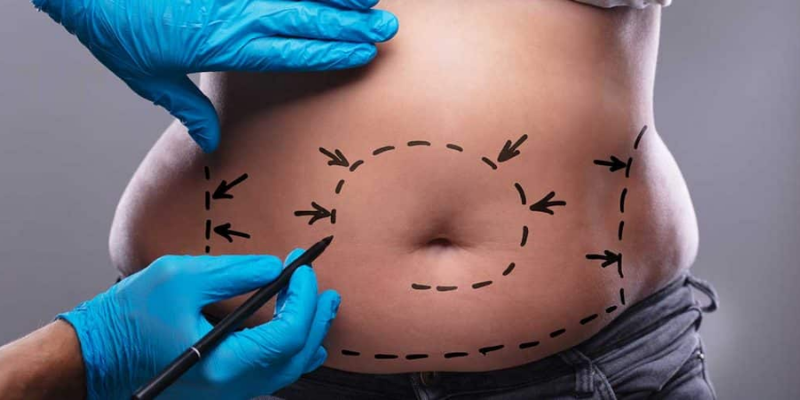Laser Weight Loss Surgery
Laser weight loss surgery sounds like the same thing as diet pills and cellulite creams, which don’t always live up to their promises. Still, if you know someone who swears by laser lipo, which is a laser fat-removal procedure, you might want to do some research to see if they’re telling the truth. Low-level laser therapy, also known as “laser lipo,” promises to be less invasive than liposuction when it comes to removing fat. Instead of going under the knife, this is done with laser treatments that last about 30 minutes, usually three times a week for six to eight treatments. Another big difference is that there’s no downtime. There are some risks with traditional liposuction procedures, but laser lipo is a less invasive option that still gives you good results.
During laser lipo, fat cells are targeted while other parts of the body are not hurt. Every laser lipo machine has lasers that can cut holes in your fat cells. When the lasers slowly cut the cells, they make them shrink. When you remove fat cells, they can cause the fat to come back in other places, like in studies on liposuction. Your body keeps all the fat cells, but they shrink. The fat is then released into your interstitial fluid and flushed out by your lymphatic system. This is how you lose weight.
Candidates For Laser Weight Loss Surgery
The best person for laser fat removal is someone who is ready to follow a diet and exercise plan that will help them keep their weight off. They don’t need to lose a lot of weight but are worried about specific areas. For people who want to lose a lot of weight, this isn’t very useful. It’s great for people who have lost weight or had plastic surgery and want to change certain parts of their bodies.
You also need to have enough time in your schedule to go to a lot of different classes each week for a few weeks. How many sessions each person needs will be different, so you’ll get a treatment plan when you meet with a doctor for the first time.
For women who are pregnant or trying to get pregnant, laser fat-removal therapies are not recommended. People who have pacemakers should not have them. If you want to try laser lipo, you should talk to your doctor first. Laser lipo won’t fix any metabolic, hormonal, or other physical problems that may have caused you to gain weight, so you should talk to your doctor first.
Laser lipo is thought to be safe by many people. If you want to get rid of extra fat, you might be a good candidate. There are a lot of places where laser lipo used to get rid of fat. These places are the stomach, face, thighs, calves, hips and back. However, some people aren’t good candidates for laser lipo because they have certain health problems. These include acute diseases, infectious diseases, heart disease, pregnancy, and malignancy, which are all long-term conditions. It’s important to keep in mind that this procedure doesn’t mean to help you lose weight.
Ho To Get Ready For Laser Weight Loss Surgery?
As for the type of anesthesia and the type of laser lipo that used, this depends on what has done. You might need to stop taking certain kinds of medicines for a certain amount of time before you start your treatment. This will help you avoid having problems. To keep in mind if you smoke, keep in mind that smoking makes it more difficult for your body to heal after you have smoked.
The laser lipo should not hurt. Before the procedure, you’ll most likely get a shot of local anesthesia. This helps keep the area where you’re having surgery numb. Time will depend on what kind of laser lipo used and how many areas you need to get rid of fat from. During the procedure, your doctor will use a piece of equipment to treat the areas that need to heal with laser energy.
How Does It Feel Getting Laser Weight Loss Surgery?
If you want to get rid of fat cells in a certain area, you may need to get down to your underwear before you start. You’ll then lie down on a table while a technician places the lasers, aiming them at the spots you want to shrink. There, the lasers do their thing, and you stay while they do it. Most sessions last between 20 and 40 minutes. Because low-level lasers are “cold” lasers, patients don’t feel a thing because they aren’t hot at all. You don’t have to take any time off because there isn’t any pain or swelling, so there is no downtime. In contrast to more invasive fat-removal treatments, you can go back to work, work out, or do whatever else your day has planned right away.
After that, though, you might feel something. If you aren’t drinking enough water, you might feel tired, woozy, or sick after a laser treatment. To get rid of fat and toxins from your body, you need to drink a lot of water.
Laser Weight Loss Surgery Aftercare
After you have laser lipo, you should expect to be a little sore for a while, but it will get better. This usually takes a few days, during which you might have to stop doing some things. You may also have to wear a compression garment for a certain amount of time to help the healing process and cut down on the risk of problems. Keep in mind that even though laser lipo can give you great results, you must be willing to take the right steps to live a healthy life.
Laser lipo has a lot of advantages over traditional liposuction. During this type of treatment, lasers used to burn fat, which has then removed from the body naturally. There is no suctioning like there is with traditional liposuction, which means there is less risk of complications. Laser lipo is also less invasive, which means there is less risk of scarring. Because of this, laser liposuction also has less downtime than traditional liposuction, which can take up to 10 days to heal.
Are Weight Loss Surgery Scars Manageable?

The good news is that weight loss surgery scars are often very manageable and can be easily made less visible. Depending on the type of surgery performed, you can manage your scars through regular creams and ointments and stay out of direct sunlight. In some cases, it is possible to reduce the visibility of your scars over time with proactive scar care and stretches or massage techniques. If your scars require invasive options, different types of plastic surgery after weight loss surgery can minimize scarring, such as using dissolvable sutures or lasers to help break down scar tissue. Ultimately, it’s essential to work with your doctor to devise a plan for managing the surgery scars that work best for you. With patience and dedication to scar management techniques, you can ensure that any visible marks from weight loss surgery will fade into the background of your life.

You should also note that certain lifestyle habits can contribute towards improving the appearance of surgical scars, such as regularly applying sunscreen when outside or avoiding extreme temperatures like hot tubs or saunas where possible. To learn more about how to deal with weight loss surgery scars, consult a doctor today.


